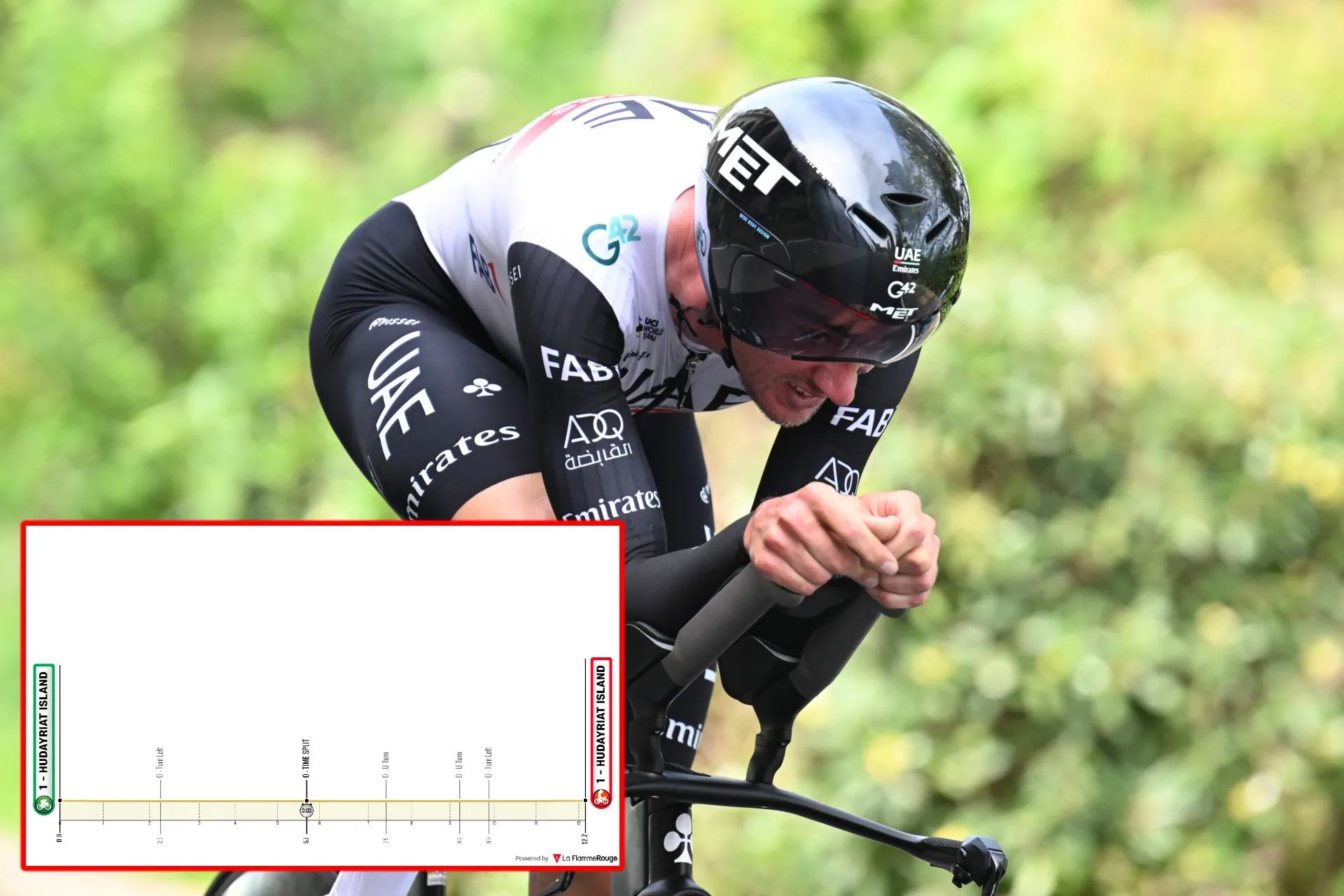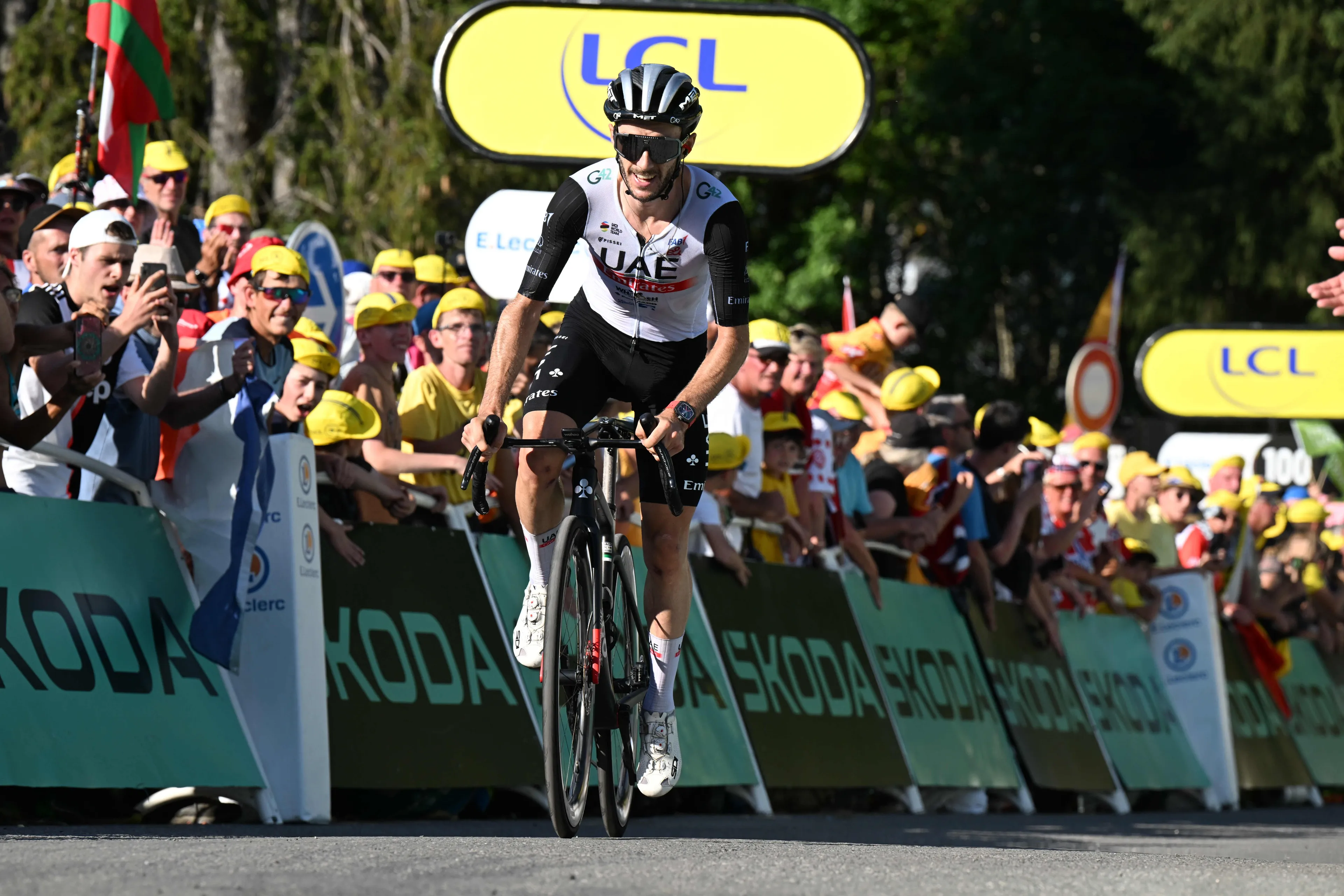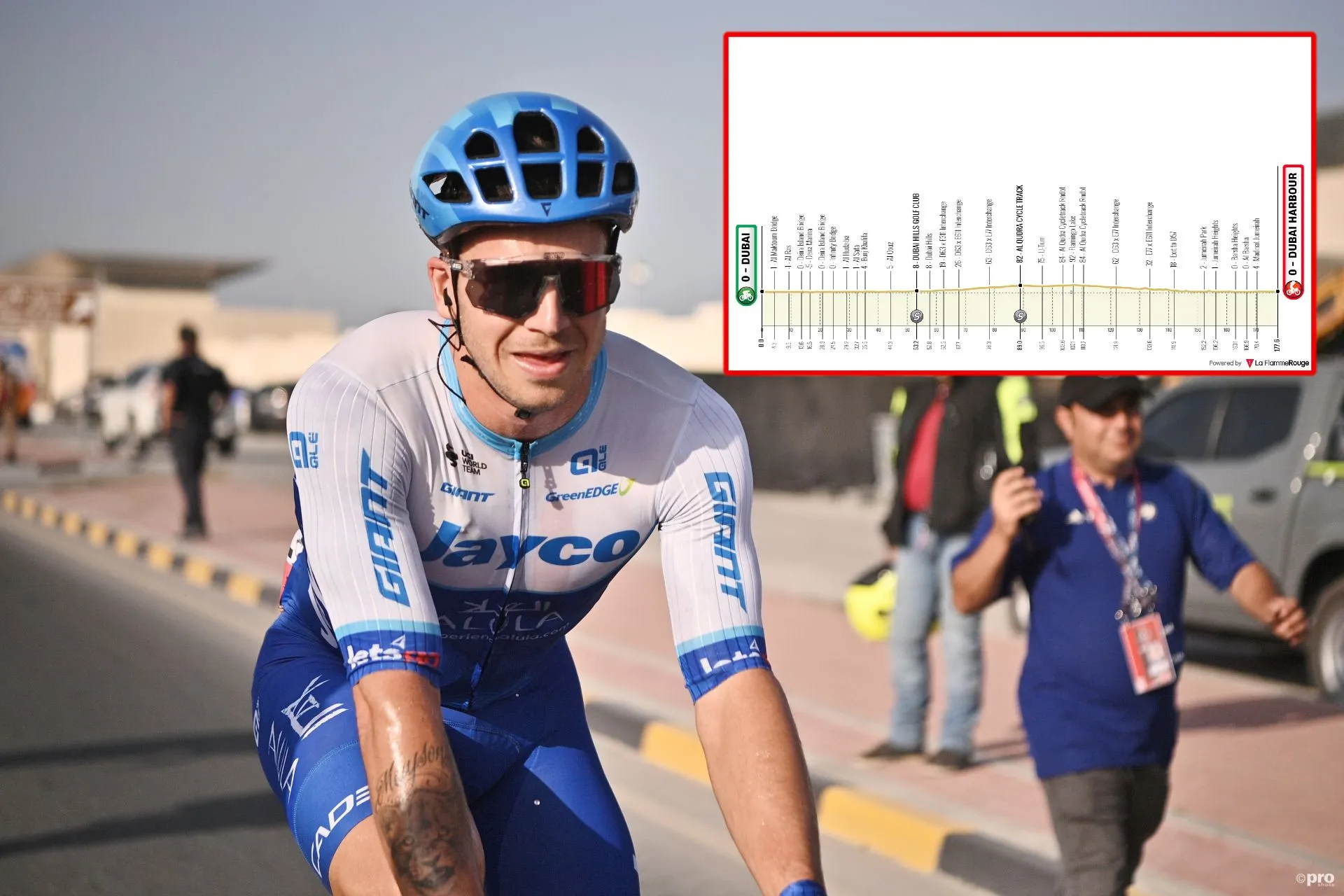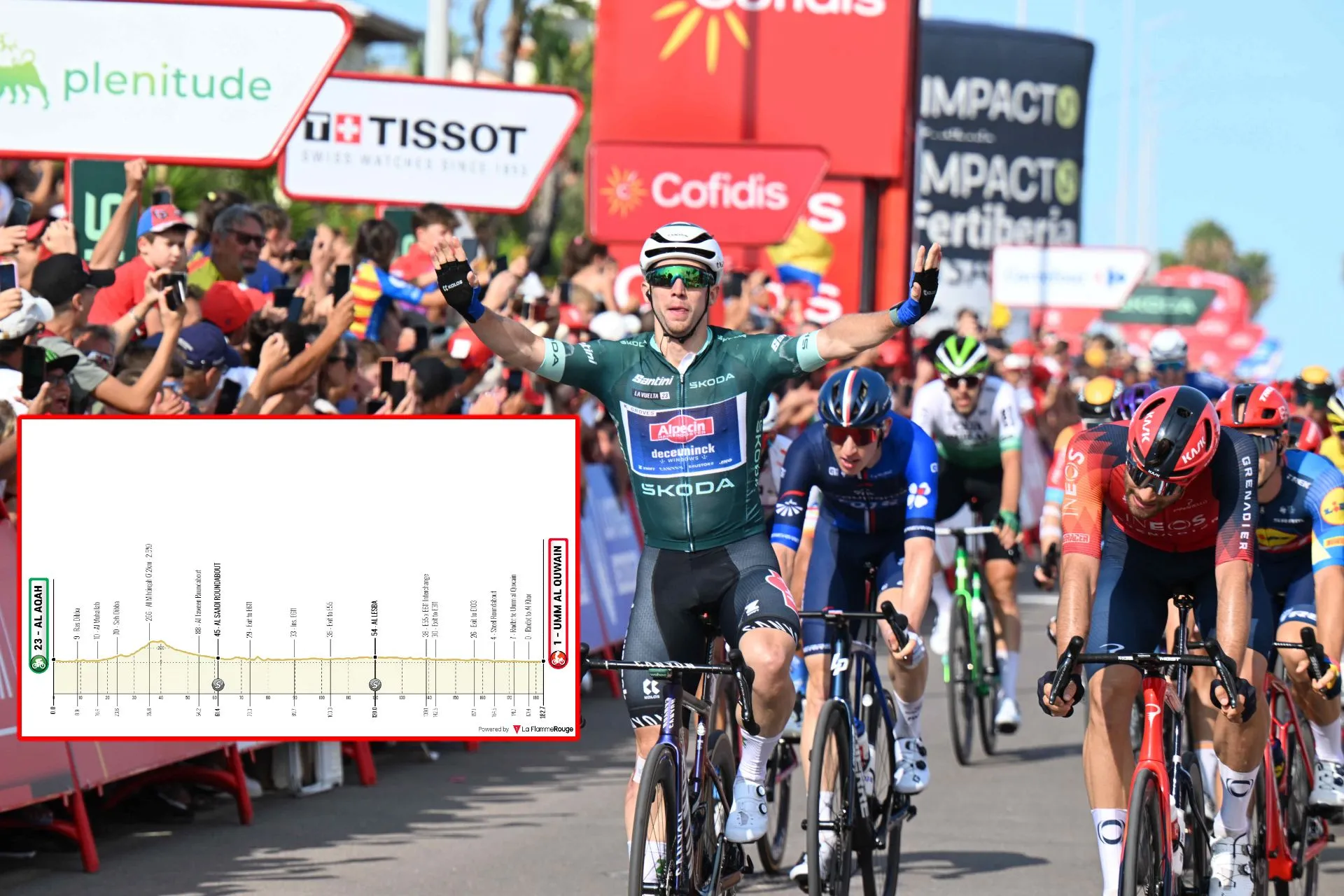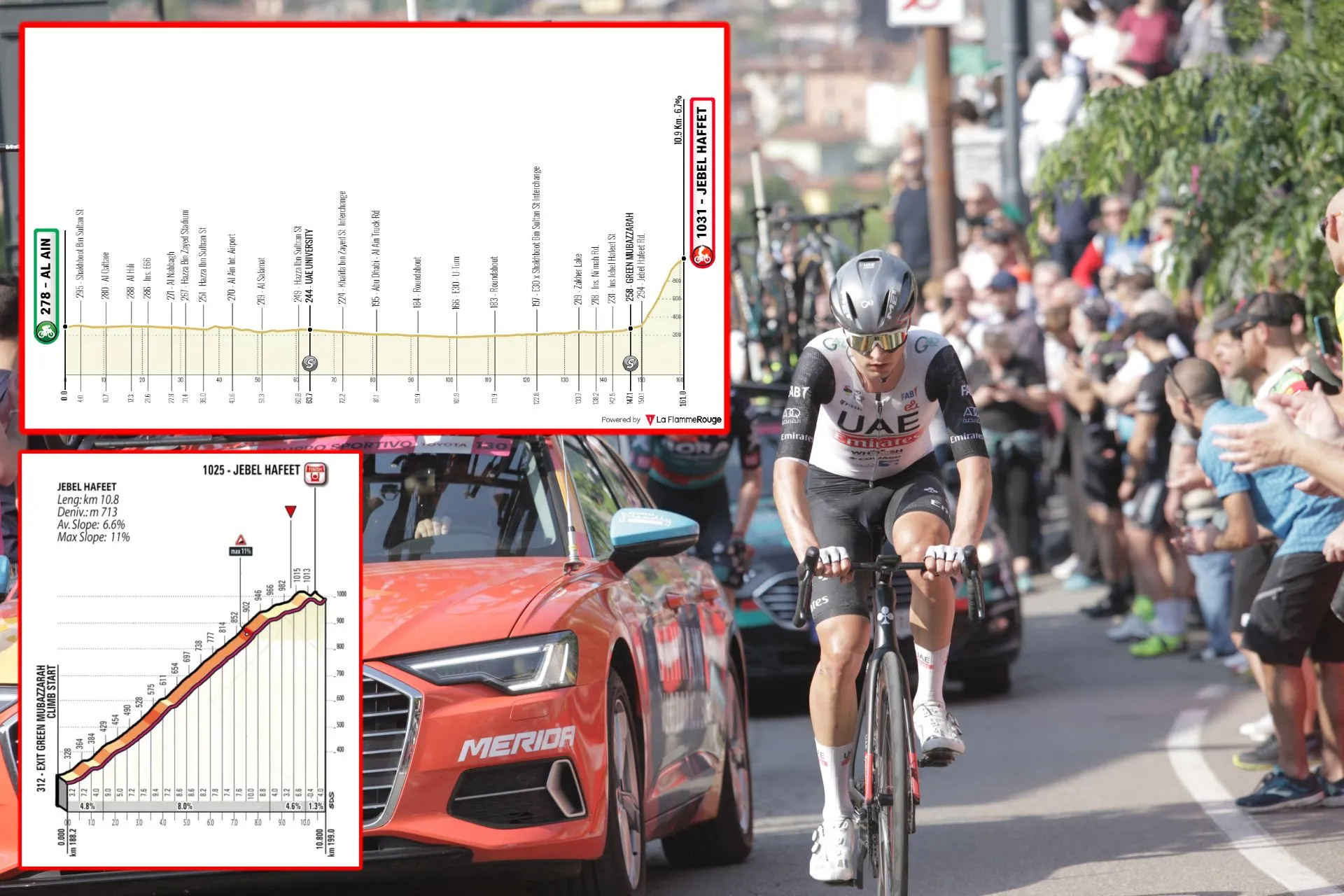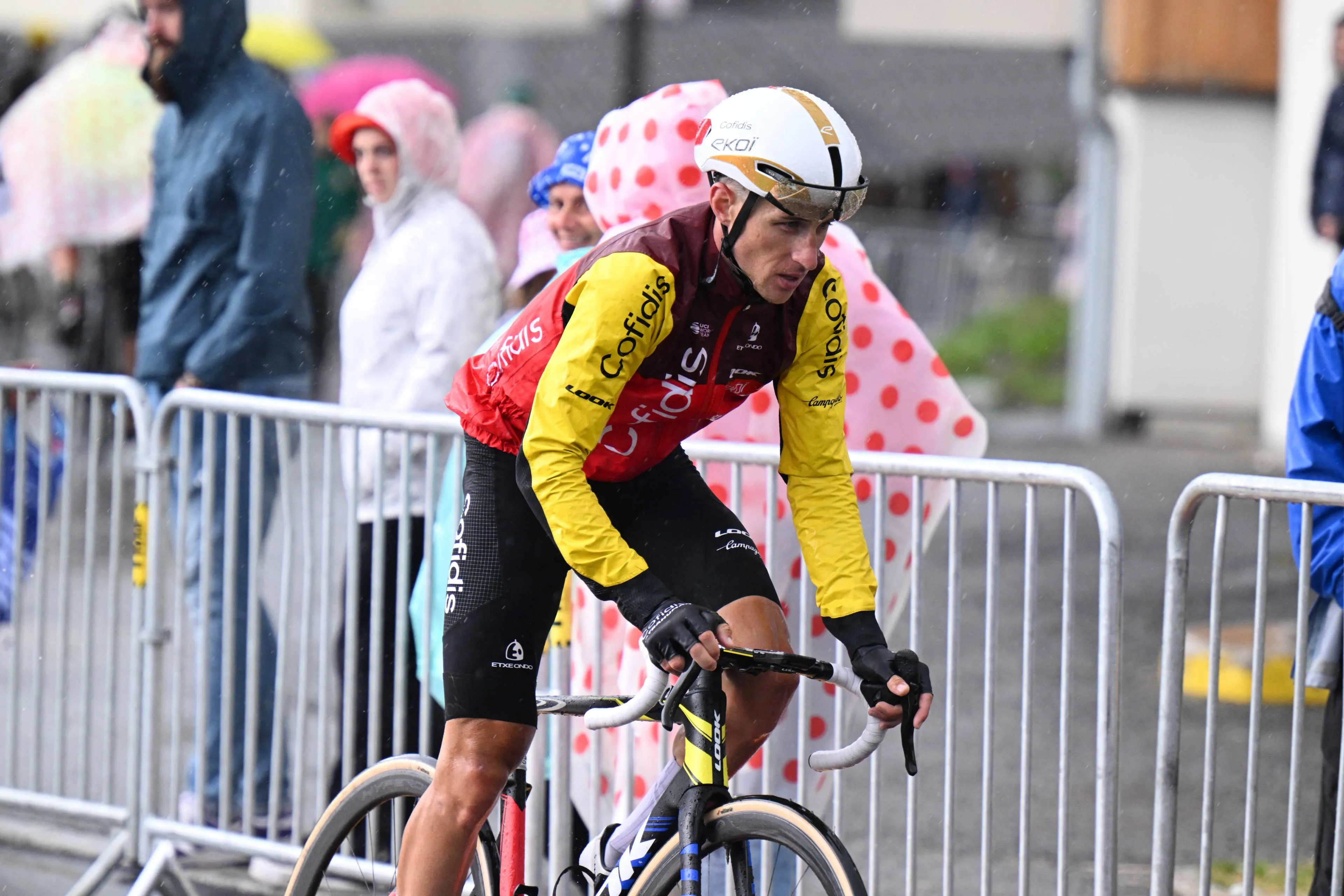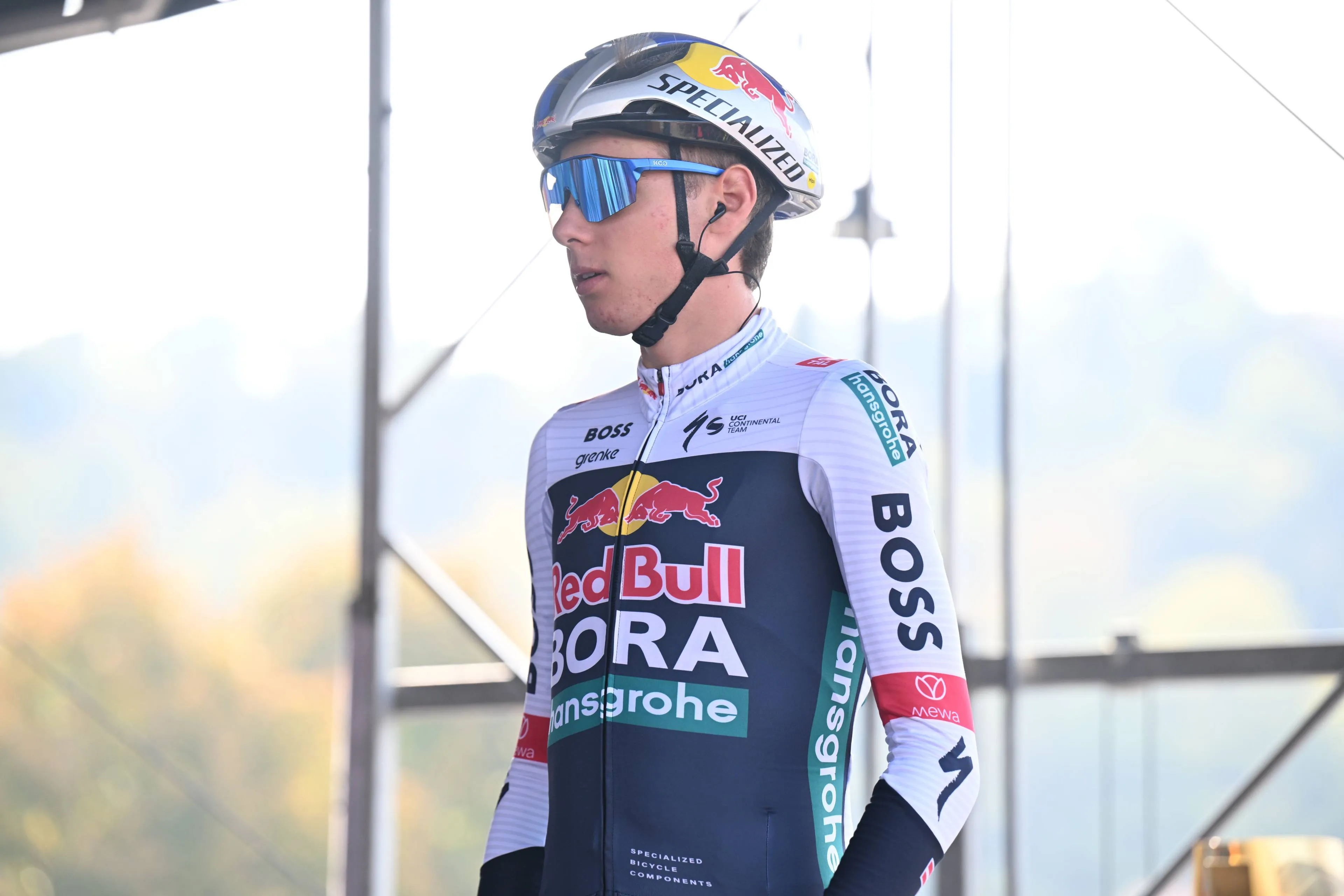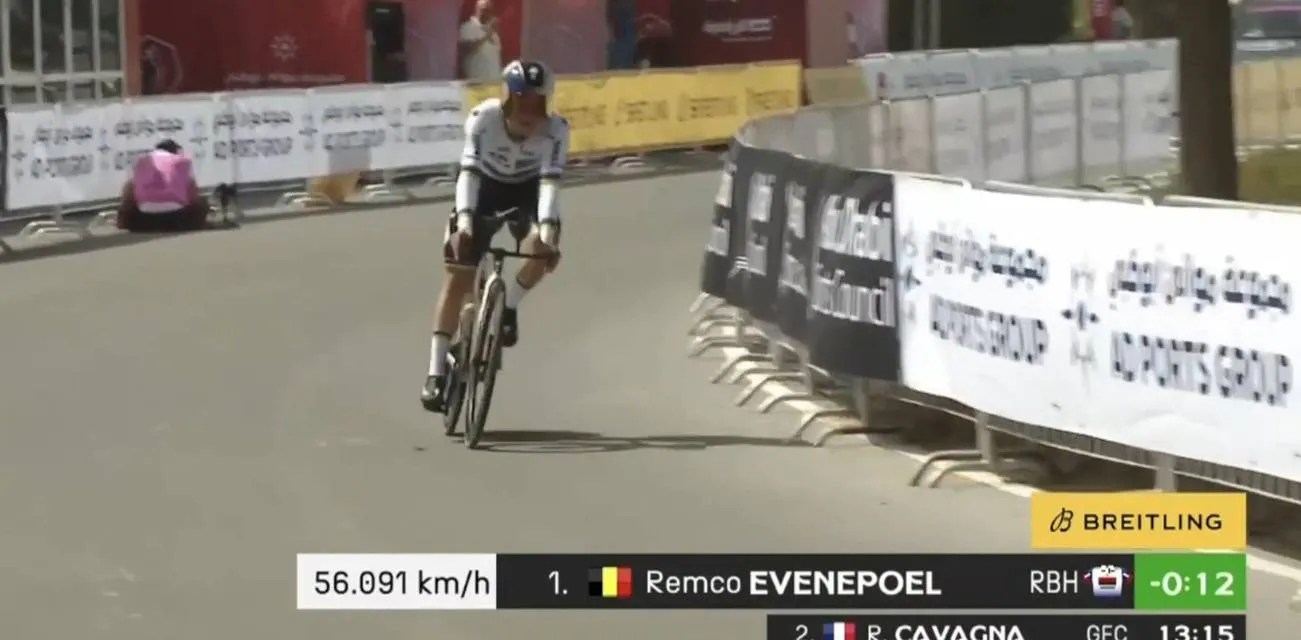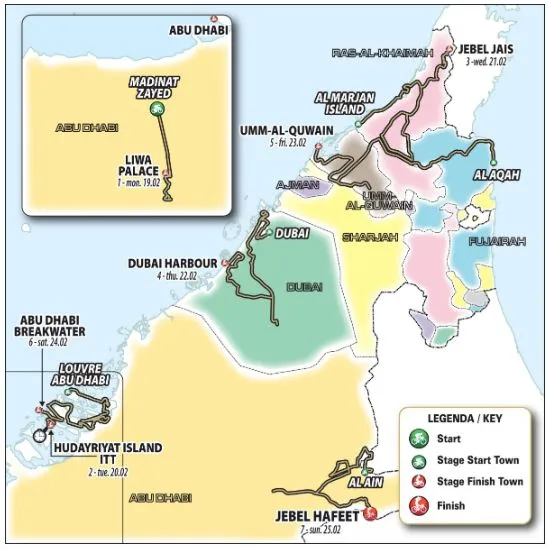
Profiles. From February 19 to 25, the UAE Tour 2024 will feature more than 980 km of competition over the seven stages. Four of them will be perfect opportunities for sprinters. The second stage will be an individual time trial, and stages three and seven (the final day) will be mountaintop finishes.
These finishes will feature the traditional climbs of Jebel Jais, where Tadej Pogacar and Jonas Vingegaard won in the past; and Jebel Hafeet, an epic climb that has seen three stage wins for Tadej Pogacar in 2020, 2021 and 2022, followed by UAE Team Emirates teammate Adam Yates in 2023. The two summit finishes and a small time-trial should decide the overall classification, whilst the sprinters will have four flat days to prove their worth.
STAGE 1, AL DHAFRA WALK MADINAT ZAYED-LIWA PALACE, 143 KM.
The desert stage. The first part (north-south direction) is approximately 45 km long, on wide and straight roads. After reaching Liwa, the race enters a zone of very steep dunes, which make up most of the stage. A series of climbs and descents leads to the Moreeb Dune, where the race will make two laps of the Moreeb Dune circuit (18.1 km each lap), marked by fairly steep climbs and descents with double-digit gradients. Then it's back to Liwa for the finish. The stage is on wide, straight roads with good pavement.
The finale however is not the typical UAE Tour dash to the line. This one will not be fast, the final 500 meters average 6% and it does rise up a little more than that to the line. An explosive and difficult sprint, in which the best will have to make quite a long effort to take the win.
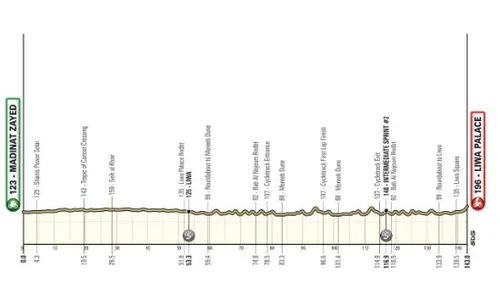
STAGE 1, AL DHAFRA WALK MADINAT ZAYED-LIWA PALACE, 143 KM
STAGE 2, AL HUDAYRIYAT ISLAND ITT, 12.1 KM.
Stage 2 is an Individual Time Trial that takes place entirely inside Al Hudayriyat Island. The route is very fast and is characterized only by a few right angle bends and two U-turns. The road is perfectly flat, wide and with sweeping curves, which will allow riders to maintain very high speeds (wind permitting).
It is an important day for the overall classification. Before the race reaches the mountains, this day will set some order amongst the climbers, and will dictate those who have to go on the attack and those who can already race in the defensive from this moment onwards.
Read also
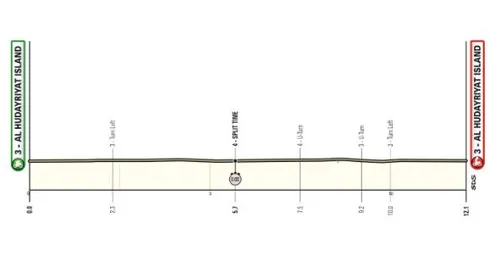
STAGE 2, AL HUDAYRIYAT ISLAND ITT, 12.1 KM
STAGE 3, AL MARJAN ISLAND-JEBEL JAIS, 176 KM.
The first of the two mountain stages of the UAE Tour. The stage is divided into two distinct parts. The first one approaches the final mountain through the desert, while the last one is characterized by approximately 20 km of continuous ascent to the finish. Starting from Al Marjan Island, the route reaches Ras al Khaimah and returns to the desert.
The Jebel Jais. A climb that has begun being used quite often in the last editions of the race, earning it's spot as the second summit finish after the UAE Tour cemented Jebel Hafeet as it's main attraction. This climb is a totally different beast however, as the gradients are constant and never overly high. The gradients start off quite gently, but in total the climb has over 21 kilometers in distance, averaging 5.4%.
And amazingly the gradients remain almost completely constant the whole way up the mountain. It reaches up to 7% towards the finale, but it's an ascent where the average speeds stay close to 30 kilometers per hour. Drafting is crucial, and attacking from far highly unlikely to succeed. Although it's a twisty road all of the hairpins are very long and doesn't actually allow for sudden accelerations to surprise. The final minutes of the ascent can make differences however as it's a decently long effort, and there will be important signs given between the riders who are fighting for the overall classification.
Read also
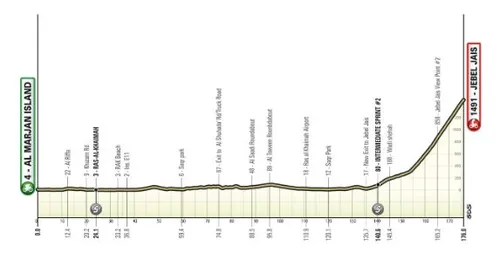
STAGE 3, AL MARJAN ISLAND-JEBEL JAIS, 176 KM
STAGE 4, DUBAI POLICE OFFICER'S CLUB-DUBAI HARBOUR, 173 KM
A stage in Dubai. The first part is in downtown Dubai, passing around the Burj Khalifa before crossing Deira and skirting the Grand Flag. The race will leave the city heading towards the desert, passing by classic sites of these stages such as Al Qudra Cycletrack and the Jumeirah Islands. It then passes through Palm Jumeirah to finish in Dubai Harbour. The entire route runs on very wide and substantially straight roads, interspersed with very large radius traffic circles and well paved.
The finale will have nothing of technical. By the sea, the riders may be exposed to wind which can make the difference in the sprint. The peloton takes on a 90-degree right turn at the entrance of the final kilometer and then have a clean run-in to the line.
Read also
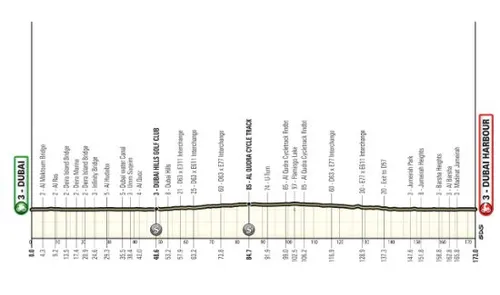
STAGE 4, DUBAI POLICE OFFICER'S CLUB-DUBAI HARBOR, 173 KM
STAGE 5, AL AQAH-UMM AL QUWAIN, 182 KM.
Starting from Al Aqah to reach Umm Al Quwain, the stage crosses the desert areas on the edge of the Hajar Mountains. Here it covers several stretches of highway until reaching Umm Al Quwain for the final sprint. The entire route is on wide, straight, well-paved roads through the desert.
The sprint is just about as least technical as one could imagine. No turns, no roundabouts, no gradients in the road... Sprinter's paradise, it will all be about timing on this day, a simple sprint that will demand sharp tactics from all leadouts.
Read also
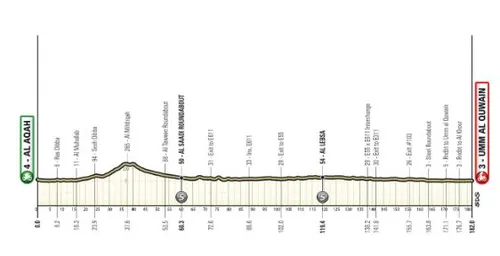
STAGE 5, AL AQAH-UMM AL QUWAIN, 182 KM
STAGE 6, LOUVRE ABU DHABI MUSEUM-ABU DHABI BREAKWATER, 138 KM
Stage around the city of Abu Dhabi. Starting from Louvre Abu Dhabi, the first part of the course heads to Saadiyat Island and then to Yas Marina, where the race continues west before re-entering the city through Khalifa City. It returns to Abu Dhabi City and passes over Al Reem Island (Sorbonne University Abu Dhabi) and Al Maryah Island. Passing through Qasr Al Hosn, riders will approach the finish from south to north, finishing at Abu Dhabi Breakwater.
This will be another very simple sprint without any technical features or gradients to mention. A pure flat sprint for the specialist leadouts, by the sea where the wind may change the plans of some.
Read also
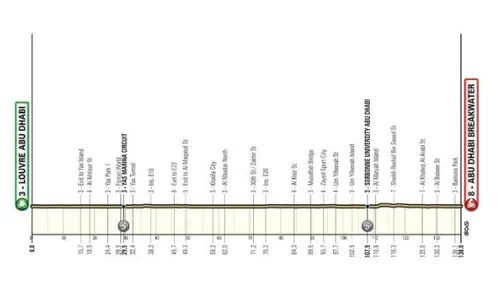
STAGE 7, AL AIN-JEBEL HAFEET, 161 KM.
The classic mountain stage of the UAE Tour. In the first part, the route winds through Al Ain, visiting many of its landmarks (Al Ain University, Al Qattara, Al Hili), and then takes a long desert ride to the west until it returns to Green Mubazzarah. Here begins the final ascent of Jebel Hafeet, which with its 10 km section will be the final judge of the race.
Aside from winds there is nothing to fear from the day. It's a short day on the bike with only 161 kilometers on the menu, but the final ascent dictates this to be the queen stage most likely. The numbers aren't brutal, but very often very big differences are created in the slopes of Jebel Hafeet. 10.8 kilometers at 6.6% are the official details, but the gradients aren't as consistent as Jebel Jais.
In it's middle 7 kilometers the grades average 8% consistently, reaching as high as 11% with some steep hairpins included. Usually the main moves happen there, in what is a wide, completely exposed road which adds to the difficulty. The final kilometers have a couple of flat and even downhill sections, with some steep ramps inbetween. The final sprint will be uphill, although the late final corner has in the past seen crashes so caution must be had.
Read also
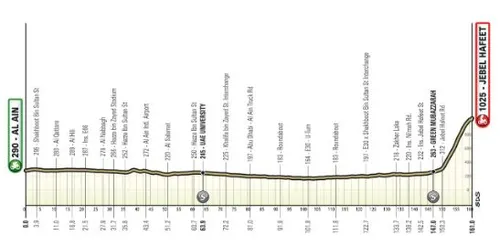
STAGE 7, AL AIN-JEBEL HAFEET, 161 KM
claps 2visitors 2
Just in
Popular news
Latest comments
- Clickbait title, not reality-based. Yawn.itsent18-02-2026
- lame, but probably correctantipodeanpedalfan18-02-2026
- Van Gils rode like wanted to get crashed or way too over confident that he was going to overtake Jan before getting pinched. It was obvious were Jan was going/had to go and MVG had the whole road to give an inch so he would have a chance to overtake on the rightjad2918-02-2026
- Double book this showing with the Melania documentary and you might get 100 people to see it...total !frieders318-02-2026
- Simple solution...stay off the barriers since you might get closed out ! Christen's sprint was legal as he was trying to get into the slipstream of Pidcock.frieders318-02-2026
- I believe Remco now understands that he will have issues reaching the top step as long as Tadej is in the Tour, whiles he's a year junior to Tadej he has had his upper body rebuilt twice now from crashes over the last few years. I think he has a chance to win the Tour in a few more seasons, you can only prepare yourself as best you can and try. He said he needs to race some more one week stage races, he should, he can probably win them all. I also believe Remco should aim for another Vuelta if he comes out of the Tour in good form and maybe he should think about the Giro again for next season. This is potentially Tadej's fifth Tour win coming up this year, no one is going to derail that unless he falls off the bike or gets really sick.awp17-02-2026
- Not only will the great narcissist get his voice, but he'll benefit financially from this as well. Who says that cheating and lying your way to victory doesn't pay?
 santiagobenites17-02-2026
santiagobenites17-02-2026 - It'll make a good double feature with the Michael Jackson soft focus biopic.LumbarDeniro17-02-2026
- Yeah, whilst MVDP would never break a bone on the MTB... 😂Sexass17-02-2026
- I think he looses too much weight and that leads to his implosions, when he doesn't worry about it or can get it exactly were he wants, like 2024 tour, he is betterjad2917-02-2026
Loading
هكذا كان شكل المنافسة في المرحلة السابعة من #طواف_الإمارات 2023 !!! Uphill battles and triumphs at stage 7 of the UAE TOUR 2023! #uaetour #uaetourwomen #cycling
Write a comment
